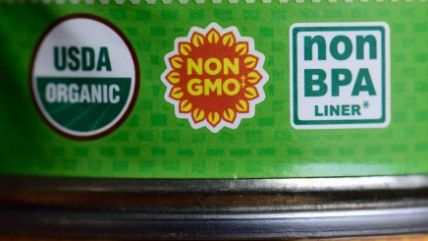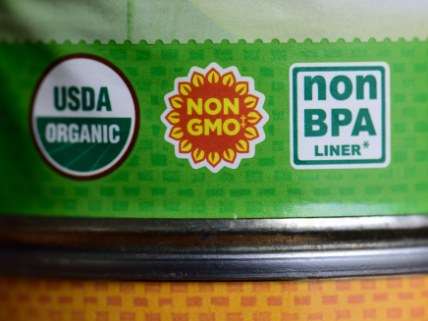Unless a Federal Court Acts Fast, Vermont's GMO Labeling Law Will Wreak Havoc on the Nation's Food Supply Next Week
It's set to take effect next week and will cost food companies for no good reason.


Federal courts have just days to stop Vermont's unconstitutional, costly, and misguided genetically modified (GMO) food-labeling law from taking effect.
The law requires food marketers of all sizes to label foods that contain GMO ingredients and to have on file a sworn statement that declares any product that doesn't have a GMO label does not contain any GMO ingredients. Those who run afoul of the law could face legal challenges from the state and from consumers, and a $1,000 fine for each violation.
The first-in-the-nation law, set to come into force on July 1, has already caused massive upheaval among food companies, which will be forced to label any food containing GMO ingredients that's sold in Vermont. That includes most foods derived from corn, soy, canola, or sugarbeets.
Study after study has confirmed GMOs are harmless to consume. Most recently, a major study released last month by the National Academy of Sciences concluded that GMOs are safe to eat.
A lawsuit challenging the Vermont law, filed in federal court in 2014 by a national coalition of grocers, is currently before a federal appeals court, which heard arguments in the key First Amendment case more than eight months ago but has yet to issue a ruling. Unless that court or another federal court issues an injunction to block the law before it takes effect, the Vermont law will wreak havoc on the nation's food supply.
The burden posed by Vermont's law isn't contained within the state's borders. Some regional, national, and international companies that sell food in Vermont and in other states—even those hoping a federal court blocks the law from taking effect—have moved to place Vermont's mandated GMO label on foods they sell in all fifty states. Campbell's and Kellogg's, for example, have announced they'll label all products nationwide with a Vermont-compliant "produced with genetic engineering" label, where applicable.
At best, that's a temporary fix. If another state were to pass its own law requiring different language on its GMO label (i.e., "contains GMO ingredients" rather than Vermont's mandated "produced with genetic engineering"), food companies would be forced to create multiple labels: one for foods sold in Vermont, another for foods sold in the other state, and yet another for foods sold in states that rightly don't require labeling.
If that sounds expensive and burdensome, that's because it is. Complying with Vermont's label rules has already cost food companies of all sizes millions of dollars in labeling changes. And the enormous costs of complying with Vermont's law will be passed along to consumers across the country, in the form of higher food prices. Estimates show the added costs could be nearly $4 billion. It's cases like this that have spurred the Supreme Court to hold the federal Constitution forbids states from acting to restrain interstate commerce.
As the deadline approaches, companies are rushing to meet the strict guidelines to avoid hefty fines and lawsuits "Companies are most worried about non-compliance," said Erin Sigrist, a spokeswoman with the Vermont Retail and Grocers Association. "There are questions spanning the entire stream of commerce that continue to pop up every day, questions that no one would think of unless they're living the process every day."
This week, the U.S. Senate inched toward a compromise that would, if passed, prohibit laws like Vermont's from taking effect. But even if that bill were to become law, it won't come in time to halt Vermont's law from taking effect next week.
Because of Vermont's mandatory GMO-labeling law, consumers, farmers, and food producers in Vermont and across America may be forced to live not just with the unconstitutional process but also with its untenable costs. It's time for our federal courts to do their job and put a halt to this law before it does further damage.
